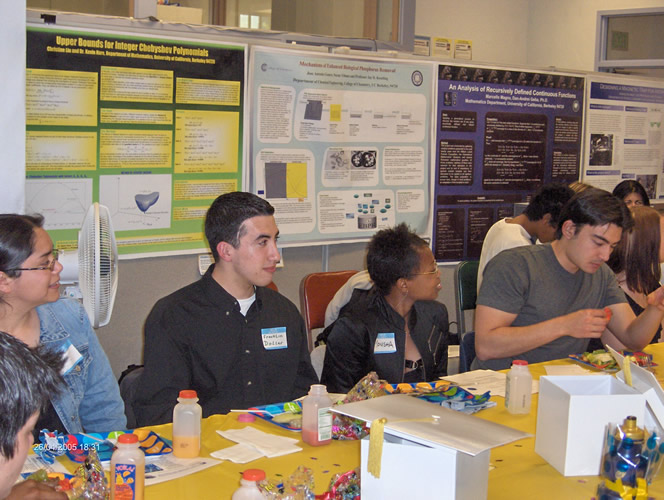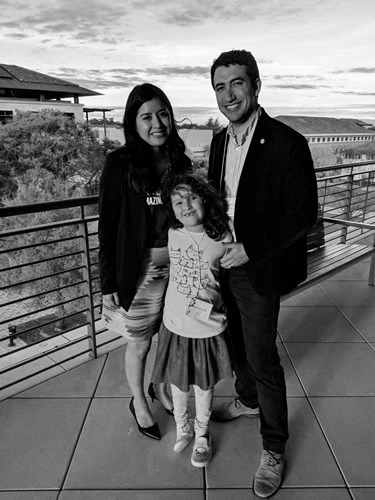Free Pizza
About Optica
26 October 2022
Free Pizza
How a free pizza played a pivotal role in the life of a Native American physicist.
In 2003, Franklin Dollar was working as a drug store clerk. One evening he noticed a flyer promoting a university research program. Bold letters at the top of the page read: “Free Pizza.” A passion for scientific research had yet to become part of his life, but the thought of a delicious, free snack caught his attention. Curious and hungry, he thought, “why not?”
Dollar felt lost at a critical juncture in his undergraduate life. Like many university students, anxiety overcame him whenever he thought about life after graduation. He was not doing well in his studies, and panic set in whenever he thought about his future. He felt a painful mix of the uncertainty of youth, a fear of failure and the trauma of a history of poverty. He believed all his troubles were due to his own inadequacy. But, as he would soon discover, his culture and beliefs were simply different from those of the individualistic university environment.
Dollar hails from the Dry Creek Band of Pomo Indians, an Indigenous Nation in California famed for their exceptional basket weavers, artists and bakers. The Dry Creek Band was one of twenty independent communities that comprised the Pomo people. The Pomo’s land in Northern California had been expansive. But by the time Dollar and his family settled on the Dry Creek Rancheria, a reservation north of San Francisco, their territory had shrunk. “The whole area used to be redwood forests. It has now become a small state within a state.” From the mid-late 1800s until the turn of the millennium, his people were not permitted to speak their language in schools, resulting in only a handful of fluent Pomo speakers today. However, efforts from the “Breath of Life” program at the University of California, Berkeley’s linguistics department to record and preserve the state’s indigenous languages have seen a resurgence in Pomo, Chumash, Miwok, Karuk and others. "In the last 15 years, the language has really developed. But it was at a low point when I was a kid.”
Dollar lived at the northern edge of Wine Country, where the disparity in wealth was stark. “On one side, you have wineries and Michelin star restaurants, but on the other, trailers and impermanent housing." Like many reservations, Dollar's Rancheria was impoverished. "There was little in the way of permanent housing. It was difficult to get a mortgage as there were not as many protections as there are in state land. Housing was, therefore, temporary. We had to get our water from a nearby well. We didn't have a hospital or a school on site, so everything was purely residential. We had no electricity until I was in high school."
For Dollar, high school was the Geyserville Educational Park, a rural school six miles away from his home. "I went to a small public school made up of an interesting mix of different cultures — mainly us and Hispanic kids whose parents came to work in the wine industry. The school had fewer than 150 people. My class of 38 people was the biggest class they'd ever had.” Dollar found a great mentor in his science teacher, who encouraged him to study physics and apply to a leading university. "My science teacher ultimately pushed me to pursue physics. He made it so that I could be the only person at Geyserville to take Advanced Placement (AP) Physics and pushed me to attend a four-year college like Berkeley instead of the local community college. He helped me with the application process and understanding higher education.”
The transition from tribal life to high school wasn’t too difficult, but moving from high school to UC Berkeley was hard.
The transition from tribal life to high school wasn’t too difficult, but moving from high school to UC Berkeley was hard. Like many students who were the first generation in their families to go to a university, college life was a whole new world. “I didn’t even know how to be a student. I had no frame of reference. My first year was a huge struggle. I went from a place where you talk to everyone all the time to speaking to no one at all. I’d have a class with five hundred students in the room, which was more people than in my high school and nearly as many as my entire tribe.” At one point, Dollar wondered what he was getting himself into. "I had no idea what these job titles meant. What was a physicist or an engineer? When I picked majors, I looked at what my friends were picking. And a lot of them were picking engineering. I ended up doing engineering physics which I chose because it sounded cool.” Dollar had come a long way, but his future was still uncertain.
Attending the free pizza night, Dollar discovered the evening was an information session for a research assistant job at the Center for X-Ray Optics at Lawrence Berkeley National Labs. He saw an environment that resonated with him. “When I saw how these people worked, I said, ‘I want to do what these guys are doing!’ I just loved the climate and the environment. And so, I applied. It was really cool. I got a tour of Lawrence Berkeley labs, and I couldn’t believe you could get paid to do that.” In Dollar’s mind, work had always been something transactional. “I thought you wouldn't get paid if you weren't physically doing something. If you were just sitting there taking measurements, how could that be work?” His time at the Center for X-Ray Optics was a formative period. “These three years helped me see how things worked and made me much better academically. It made me see that's how people learn and do science. After that, I could emulate it — instead of locking myself in a library.” The research environment allowed Dollar to bring an element of who he was to his work. “Everyone was in one office together. You could chat and come up with ideas and talk with the advisers, and we could try stuff out. I could ask questions. I really loved the environment. The pizza was nice too!”
“I thought you wouldn't get paid if you weren't physically doing something. If you were just sitting there taking measurements, how could that be work?”
Separating personal and professional identities was something Dollar began to see as a potential hindrance to scientific discovery. “When you come into society like this, you feel like you’re walking in a different culture and climate, so it’s almost like you have to wear a mask. You have two selves, your professional self and the real you, that goes home with family. I guess that makes me mad that this is a thing that exists. We are saying that there is a dominant way that people should be, and we shouldn't tolerate deviations from that. Now I’ve concluded that we are worse off not having a more open and broader scientific community. Let's look at other fields where these big jumps happen when other fields talk to each other. It's the basis of modern scientific discovery. When we say we are humans, we are not going to do that, it seems absurd to me. We should embrace that people are different and do things in different ways.”
Dollar thrived when he realized he could bring his family and community values, which focused on helping others, to his new work. “I would often ask, 'What can I do to best serve everyone?' In Western culture, we don’t emphasize that so much, especially in schools. In the physical sciences, it's a very individualistic journey. We need to think about the broader community and how it will be best served by these types of actions. We are now at a point where not a single group can do the most groundbreaking science independently, but collaborations can." His empathy and understanding gave him a unique perspective on learning styles and how to help other students. “When I started taking classes and doing pretty poorly, I thought it was because of my deficiencies. I thought it was because I came from a small school that I was not prepared or that I was not smart enough. I just kept coming up with excuses for why I wasn’t doing very well. It took getting involved in research to turn things around.” At the Center for X-Ray Optics, Dollar could talk out loud and discuss things openly with a team of people. “I found that the best way to learn was communicating with people —nobody learns on their own. And that's true for everyone, not just the students who come in who are the first generation from underrepresented communities. They have difficulty finding communities because they come in with one or two students at a time and leave the program. Those are very solvable problems we can discuss and try to fix.”
Dollar thrived when he realized he could bring his family and community values, which focused on helping people, to his new work. “I would often ask, 'What can I do to best serve everyone?'
When Dollar’s time in the collaborative environment at the Center for X-Ray Optics ended, he was slowly becoming an accomplished academic. But his position and status had not quite sunk in yet. When he had his first paper published in Optics Express, he was filled with disbelief and amazement. "I still didn't quite understand what a publication was or what it meant. But doing some research that was important enough to write it up and send it in and then see it in a book somewhere was an amazing concept to me. It was my first piece, so I went into the library and took a picture of it. I don't do that anymore!"
In a generational relay race, Dollar has maintained a desire to pay it forward to continue the progress, passing the baton so the next Franklin Dollars can start running ahead. Committing to numerous recruitment and retention efforts for underrepresented students, he has helped Native Americans in STEM fields. In 2018, Dollar won a National Science Federation Faculty Early Career Development Program (CAREER) Award, a prestigious prize for early career professionals who have shown the potential to serve as academic role models and to lead advances in the mission of their department or organization. In 2021, Dollar won the Tom Angell Fellowship Award, an annual UCI prize from the Office of Inclusive Excellence's Mentoring for Achievement and Excellence to honor contributions to graduate student wellness and retention. He has spoken on challenges for native students where academic study conflicts with their cultural beliefs. He has encouraged students to find ways to combine the pursuit of scientific knowledge while also remaining true to their culture.
"It's really rare to find someone who cares about people like Franklin does. He is conducting the best research but somehow still manages to serve others.”
Donna Strickland
In October 2022, the American Physical Society (APS) Division of Plasma Physics named Dollar an APS Fellow. The honor recognizes both Dollar’s research into high-intensity laser physics, and his committed efforts to change the culture of his field in the realms of diversity, equity and inclusion (DEI).
Today, Franklin Dollar is Associate Dean of Graduate Studies and Associate Professor of Physics and Astronomy at the University of California, Irvine School of Physical Sciences. He is currently working on the most powerful laser in the United States — the Zetawatt-Equivalent Ultrashort pulse laser System or ZEUS — where he and his team are preparing to send its first pulses into an experimental target this fall. But, in the words of his peers, caring about the broader community is something that is as important to him as making groundbreaking discoveries. Nobel Laureate, Donna Strickland, said:
"It's really rare to find someone who cares about people like Franklin does. He is conducting the best research but somehow still manages to serve others. While working on this massive project, ZEUS, he has found ways to extend access to science beyond those attending Berkeley, Michigan or Colorado to students in smaller schools and minority-serving intuitions. These are people Franklin cares about. His efforts are expanding representation in the field and helping us all meet desperate workforce needs. He is really quite special."
Dollar's work will help researchers make discoveries in quantum physics and advance our understanding of space by recreating the extreme behavior of stars with incredible magnetic fields in a lab. However, he still has one eye on helping the underrepresented. “We are definitely at a time when we need other ambassadors. Most of the people I know are white men. It's physical sciences, so statistically, that's going to be the case. Optica is in a great place to address this.”
Media Contact




